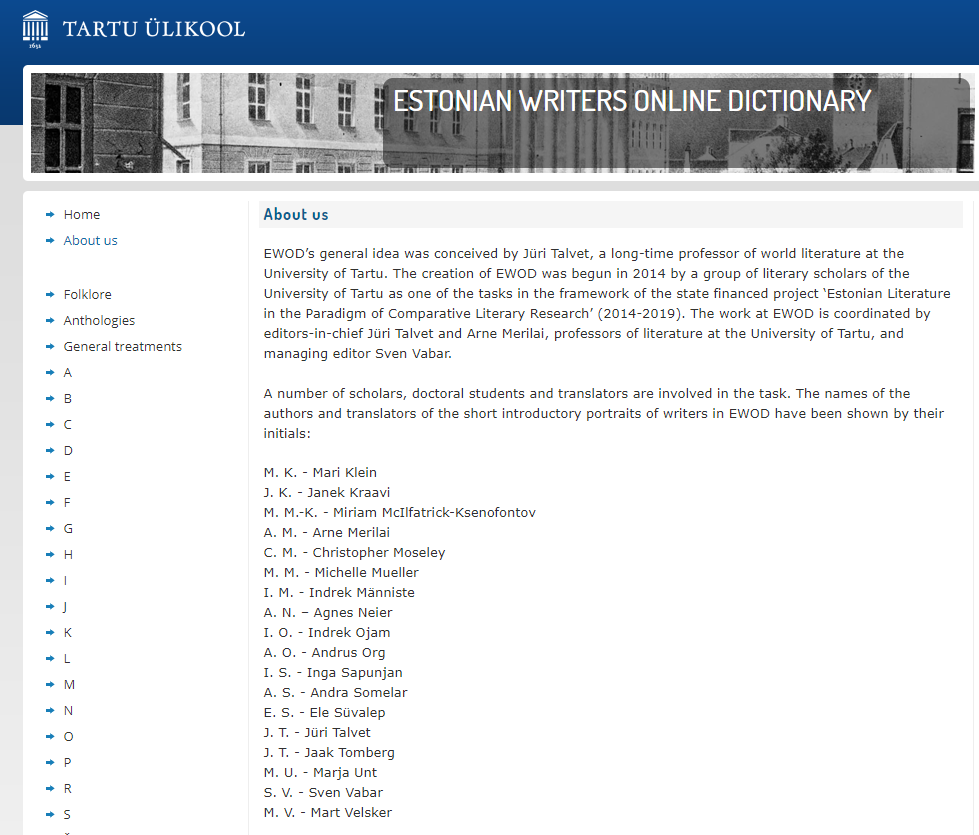EWOD (the Estonian Writers’ Online Dictionary) is a lexicon and database compiled by literary researchers at the University of Tartu, the primary goal of which is to provide information about Estonian literature in foreign languages.
An extensive database and lexicon, EWOD aims to collect exhaustive bibliographical information about Estonian literary works translated into foreign languages, as well as to gather foreign-language reviews of such books from all time periods and sources ranging from academic journals to newspapers. Since this data is, generally, otherwise nearly impossible to access, especially in the case of pre-Internet newspapers, we can luckily (or unfortunately) state that EWOD will never be completely finished, meaning it has the potential to be perpetually updated. As a database for foreign-language reviews of Estonian literature, EWOD is democratic and quantitative: presently, there are 627 authors listed, and the list keeps on growing.
EWOD users will find that some names in the menus are bolded and clicking on them shows not only the sub-menus for foreign-language translations, but an English-language profile covering the author’s life and a bibliography of their Estonian-language works. This brings us to EWOD’s quantitative aspect: it’s not simply a database, it’s a literary lexicon. Not all of the current 627-plus alphabetically-listed writers in EWOD’s menus may get an English-language profile on the site just yet, even if they have been translated into a foreign language. Alternately, some writers who have no known translations to date may earn a profile, regardless. There are plans to create profiles for all members of the Estonian Writers’ Union, for example.
EWOD may also be a potentially useful resource for Estonian speakers, as the most recent Lexicon of Estonian Authors (compiled by Oskar Kruus and Heino Puhvel) was published in 2000 and is now outdated. If a new Estonian-language lexicon should ever be drafted, then the materials compiled in EWOD would be a valuable source of information for those putting it together.
It’s also important to note that EWOD’s editors did not judge an author’s popularity when drafting and commissioning the profiles, but rather their relevance in regard to Estonian cultural history. As a result, users might not find profiles for the most well-known or highly-translated Estonian authors, even though they will come across ones for figures such as Georg Müller, Heinrich Stahl, and B. G. Forselius, who were significant from a standpoint of the formation of Estonian as a written language. Similarly, we’ve paid special attention to authors who, for one reason or another, have ended up in the peripheries of Estonian literature, but still deserve greater attention – Madis Kõiv and Uku Masing, for example. We have tried to refrain from excessive judgement (which has, at times, emerged in earlier Estonian literary lexicons) and limited ourselves to long-developed historical consensus when characterizing works. And, as always, what one literary researcher sees as a shortcoming may be a defining beacon of ingenuity to another.
Someone attempting to compile an all-encompassing database or lexicon of Estonian literature inevitably comes across the question of: what is Estonian literature, and how do you define its scope? Can Baltic-German or Russian-Estonian literature (i.e. authors like P. I. Filimonov and Andrei Ivanov) be considered Estonian literature? After lengthy discussion, the editors came to the conclusion that EWOD will only include literature written in the Estonian language, though we emphasize that each author will be considered on a case-by-case basis.
Behind the idea of creating EWOD is the University of Tartu’s long-time Professor of Global Literature, Jüri Talvet, who is likewise its editor-in-chief. EWOD’s second chief editor is Arne Merilai, a Professor of Estonian Literature at the University of Tartu. Work began on the project in 2014. Sven Vabar serves as its acting editor and has gathered the vast majority of bibliographical information contained in the database. Author profiles have been written by Arne Merilai, Mart Velsker, Ele Süvalep, Mari Klein, Inga Sapunjan, Agnes Neier, Indrek Ojam, Andrus Org, Sven Vabar, and several other employees and doctoral candidates associated with the University’s Department of Estonian Literature. Miriam McIlfatrick-Ksenofontov, Christopher Moseley, Michelle Mueller, and Andra Somelar have done translations for EWOD.
Sven Vabar graduated from the University of Tartu with a master’s degree in semiotics. He has published prose, literature and music reviews, compiled Mitte-Tartu (Non-Tartu, 2012) – a collection of short prose, and works as an editor of EWOD at the University of Tartu’s Department of Literature and Theater.

